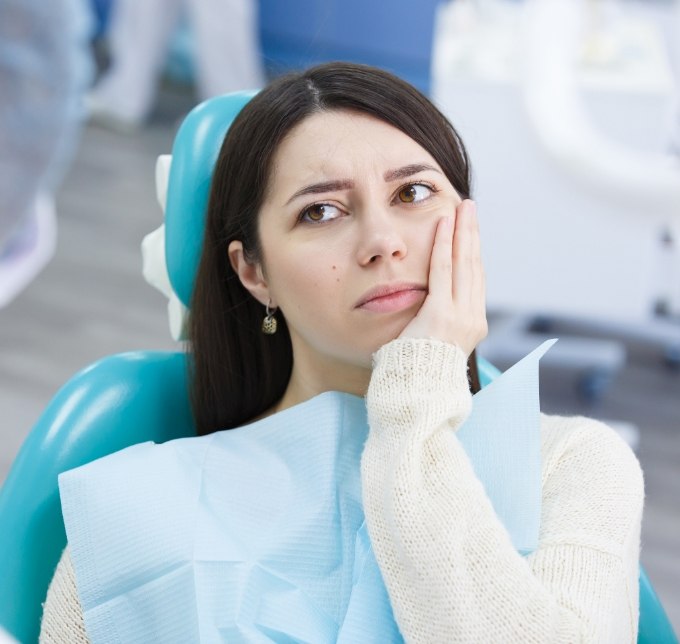Emergency Dentistry Albuquerque
Broken Tooth? Oral Discomfort? We’re Here to Help
Dental emergencies never seem to come at a time that is convenient for patients and families. If you or a loved one is struggling with alarming dental trauma, Dr. Monica Boehmer welcomes your call to our dental office. As an emergency dentist in Albuquerque, she strives to accommodate urgent situations as soon as possible – you will never have to worry about being made to wait in vain for days or weeks at a time. Our team members can also provide first-aid guidance over the phone if you’re unable to reach our practice for some time. Contact us today!
Why Choose Dr. Monica Boehmer for Emergency Dental Care?
- Outstanding Restorative Solutions For Fractured, Tender, & Lost Teeth
- Same-Day Appointments Available for Emergency Patients
- Calming Sedation Options for Comfortable Treatment
What to Do in a Dental Emergency

Have you fractured, dislodged, or even knocked out a natural tooth? Are you experiencing a great deal of sensitivity in a specific area of the mouth? These accidents can happen in the blink of an eye, and often when patients and families are least expecting them. As a first step, please do your best to remain calm. Then, follow these easy steps to get your dental emergency under control:
- Step 1: Pick up the phone and contact our Albuquerque dental practice to schedule your emergency dental appointment, typically for the same day.
- Step 2: Follow the first-aid instructions provided by one of our experienced team members over the phone for handling your situation until you arrive at our office.
- Step 3: See Dr. Boehmer for your emergency dental exam, where she will address your dental discomfort and examine your teeth and gums to learn more about your emergency.
- Step 4: Dr. Boehmer will review her findings with you and explain which treatments she recommends. Together, you’ll create a custom treatment plan.
- Step 5: Our talented team will get to work right away to repair your smile and save your teeth. If needed, we may offer calming dental sedation for maximum comfort and stress-free treatment.
Unparalleled Experience & Qualifications

When it comes to credentials and clinical training, Dr. Boehmer’s dedication is truly second to none in the greater Albuquerque community. She has completed over 1,500 hours of continuing education in advanced services, including time spent at the prestigious Las Vegas Institute and with SPEAR Education. She is also a Fellow in the Academy of General Dentistry, which is an accolade that only around 7% of general dentists in the world achieve over the course of their careers. She will address your dental emergency from an angle of true expertise, revitalizing teeth with plenty of meticulous attention to detail.
The Most Common Dental Emergencies
Dental emergencies tend to fall into two distinct categories: those that are brought about by a sudden injury or accident, and those that gradually develop over time due to an untreated issue or poor oral hygiene. While some dental emergencies are easy to identify, others can be more confusing. Generally, if you are experiencing a damaged or knocked-out tooth, a toothache, or any other concerning symptoms in your mouth, don’t hesitate to call us right away. Even if you are unsure if your situation qualifies as a dental emergency, you should call us anyways. Over the phone, we’ll determine if you need to be seen right away or if your situation can be handled at home. Below, you’ll find some important information about handling and treating the most common dental emergencies.
Keys to Preventing Dental Emergencies
Preventing dental emergencies may not always be possible; however, your teeth and gums can be better protected against infection and accidental falls as long as you take a proactive approach. At the dental office of Dr. Monica Boehmer, our team is here to provide helpful tips to ensure that your smile remains damage-free throughout the year. Take a look below and feel free to give us a call if you have any questions.
Keep Your Regular Dental Appointments
Dr. Boehmer is not the only one to recommend six-month dental checkups and teeth cleanings. The American Dental Association also suggests twice-yearly visits because of the benefits they can have on one’s oral and overall health. Forgoing this type of treatment can lead to infections, tooth loss, and more. By allowing our skilled team to examine your teeth, gums, and facial structures, we can make sure that no decay, cavities, gum disease, or oral cancer exists. Clearing away accumulated plaque and tartar from your smile also allows for a reduced risk of gum pockets and advanced periodontitis.
Keep Brushing and Flossing
While seeing your dentist twice each year for professional exams and cleanings is important, the remainder of the year should have you practicing good oral hygiene habits at home. Your daily routine of brushing, flossing, and rinsing are great ways to reduce the number of bad oral bacteria inside your mouth. When allowed to accumulate, it can break down tooth enamel, causing cavities to form. However, staying on top of your dental routine will help lower your chances of experiencing a dental emergency.
Be Mindful of What You Eat
A healthy diet does more than help with your gut and weight. It also aids in caring for your teeth and gums. Too much sugar and starch can cause cavities and severe toothaches – two things that require timely attention from your dentist. But incorporating plenty of leafy greens, lean meats like turkey, chicken, and fish, calcium-enriched foods, fruits and vegetables, and water into your diet will help to safeguard your teeth and soft oral tissues from plaque and tartar that might otherwise form and cause infections.
Wear a Mouthguard to Protect Your Teeth
Some of the most common dental emergencies that dentists treat are often tied to sports-related injuries and worn-down tooth enamel. Your teeth need proper protection whether you’re on the field playing your favorite game or when going to bed. Wearing a custom mouthguard to safeguard against sudden hits to the face or teeth grinding at night will significantly lower the possibility of a knocked-out tooth, tooth sensitivity, worn-down enamel, chips, cracks, and more.
Use Tools to Open Packages, Not Your Teeth
It may seem harmless to tear open a bag with your teeth, but the reality is that your pearly whites are not designed for anything other than chewing through food. Small fractures can occur over time, breaking down your enamel and causing it to become weaker. Taking the time to find the right tool to open a box, container, or bottle will not only get you what you want faster but also better protect your teeth and gums.
Dental Emergency FAQs
Should I Go to the ER for My Dental Emergency?
There are only a few instances where making a trip to the emergency room for a dental emergency is highly advised. These include:
- Continuous bleeding that doesn’t stop after 10-15 minutes
- Increased swelling that’s making it difficult to swallow
- Fractured, dislocated, or broken jawbone
The reason it is encouraged that you seek help from an emergency dentist for any other type of dental emergency than the ones above is that they are considered to be “urgent” but not life-threatening. Also, your dentist is fully capable of treating toothaches, knocked-out teeth, soft tissue injuries, chipped teeth, or even lost crowns and fillings. So, avoid the long wait times at the ER and let a skilled dentist provide start-to-finish care in less time.
Why Is Seeing a Dentist the Best Choice in a Dental Emergency?
The reason you should see your dentist instead of visiting the emergency room is that:
- Your dentist has the educational and professional knowledge and background to treat most emergencies. A general doctor can only treat your symptoms in most cases.
- You will not have to deal with long wait times at your dentist’s office, as staff will work to schedule a time when you can come in.
- Your emergency dentist can detect and diagnose your problem with a personalized treatment plan designed to repair and improve your oral health.
What Can I Do to Manage a Toothache?
It is recommended that OTC medication and cold compresses are the best ways to reduce discomfort when faced with a dental emergency. Naturally, when calling and speaking to one of our staff members, we can provide recommendations as to which products to use and for how long, but make sure to only take them as instructed. If you continue to experience discomfort for a prolonged period, it may be an underlying issue that is worse than a typical toothache. This would require that you come in for an emergency visit and let Dr. Boehmer examine your problem area.
Does Dental Insurance Cover Emergency Dental Visits?
You are strongly encouraged to review your dental insurance policy long before an emergency occurs. While most insurance companies understand that accidents happen, the amount of coverage you will receive depends on the type of restorative care you will need. Most insurers will cover between 70-80% for minor services and between 50-70% for major services.
If you are unsure what questions to ask or how to determine your level of coverage, don’t hesitate to ask one of our qualified team members for help. They will contact your insurance company and retrieve all of the answers you will need to make a confident and well-informed decision about your dental health.
I Need a Checkup & Cleaning I Need a Dentist for My Child I Have a Cavity or Broken Tooth I am Missing One or More Teeth I Want to Enhance My Smile I Want to Straighten My Teeth I am Worried About Gum Disease I Have Jaw Pain & Headaches I am Scared of the Dentist View Our Services
